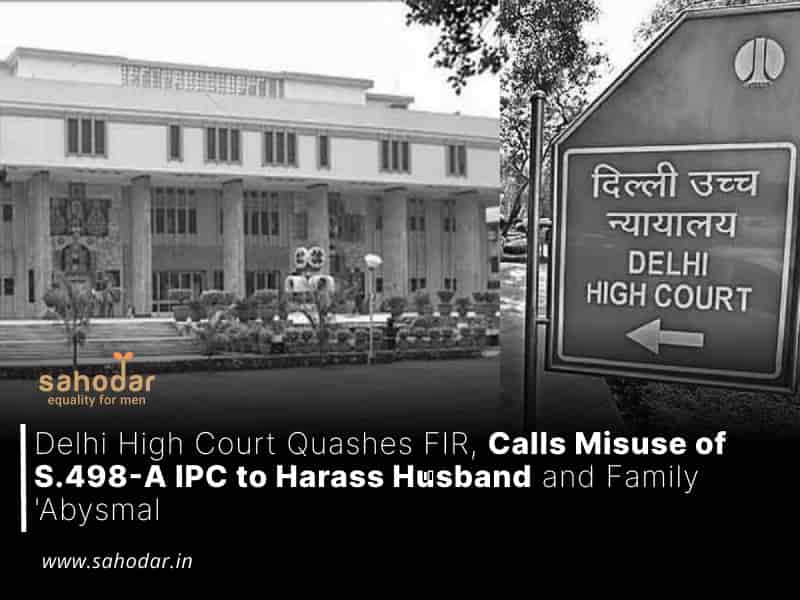Such matters are now filed in the heat of the moment on advice of counsel by exaggerating and misconstruing actual events. However, this does not mean that genuine cases of harassment didn’t exist, and it is not blind to the ground reality of the deeply rooted social evil of greed for dowry.
The Delhi High Court, while hearing a petition seeking the quashing of an FIR dated 06-10-2017—registered under Sections 498A and 342 of the Indian Penal Code, 1860 (‘IPC’)—observed the growing trend of implicating husbands and their families in matrimonial disputes. Justice Amit Mahajan noted that although Section 498A was introduced to address the harassment of married women, it was concerning to see its misuse as a tool to harass husband and family for leverage.
The Court emphasized that in cases where vague and delayed allegations are made against the husband, continuing proceedings would constitute an abuse of the legal process. Consequently, the Court quashed the FIR along with all related proceedings.
Background
The present FIR was filed by Respondent 2 (the ‘wife’) against the petitioner (the ‘husband’) and his family members, alleging harassment related to dowry demands and the non-return of her stridhan. The couple’s marriage took place on 25-12-2011, and it was claimed that Rs. 10 lakhs were spent on the wedding.
According to the allegations, the husband, along with his father, mother, and brother, taunted the wife, stating that despite his monthly income of Rs. 6 lakhs and receiving multiple marriage proposals, he had married her because they believed her father, a government officer, would match their social status.
Further, it was alleged that the husband’s family had expected a Honda City car but were disappointed that they had not even received a bike. They allegedly ridiculed the wife, calling her father greedy for not giving them gold items, a bike, or a car. Additionally, the husband and his father were accused of defaming the wife by calling her characterless and refusing to return her stridhan despite multiple requests.
However, the husband contended that he was falsely implicated in the case. He claimed that the FIR was filed against him and his family to conceal the wife’s alleged adulterous conduct. He asserted that they had separated after he discovered photographs of his wife with another man and that they had mutually agreed to divorce before a biradri panchayat, following which a joint divorce petition was filed. He further argued that the allegations in the FIR were vague and general, and continuing legal proceedings against him would amount to an abuse of the court’s process.
Analysis, Law, and Decision
The Court observed that if legal proceedings were found to be manifestly frivolous, vexatious, or initiated with an ulterior motive of vengeance, it was necessary to examine the FIR with extra caution. The High Court had the authority to assess the surrounding circumstances, scrutinize the case records, and read between the lines. If the allegations appeared exaggerated or indicated misuse of Section 498A of the IPC, the Court could intervene under Section 482 of the Criminal Procedure Code, 1973.
Referring to Achin Gupta v. State of Haryana, the Court noted that, similar to that case, the present FIR contained sweeping and generalized accusations against the husband, without any specific date, time, or details regarding the alleged dowry demands or harassment. The Court emphasized that when an FIR was challenged as being frivolous, it had a duty to look beyond the allegations and consider the surrounding circumstances.
The Court further noted that in a complaint made by the wife’s father to the SHO on 09-05-2015, he alleged that the husband and his family had threatened to misuse certain obscene photos and videos to defame the wife’s family. However, the FIR itself contained no mention of such threats. Additionally, the complaint did not specify any particular incident of dowry-related harassment by the husband on that date. Based on these inconsistencies, the Court found merit in the husband’s argument that the allegations were an afterthought and a retaliatory move against the divorce petition.
The Court observed that on 23-08-2019, the husband had obtained a divorce decree on the grounds of cruelty, wherein it was noted that the wife had willingly engaged in physical intimacy with her boyfriend. Notably, the wife had not challenged this finding.
The Court also acknowledged the rising trend of implicating husbands and their families in matrimonial disputes. While Section 498A of the IPC was originally enacted to protect married women from harassment, it was concerning to see its misuse as a tool to harass husband and family for leverage. The Court remarked that such cases were often filed in the heat of the moment, sometimes at the suggestion of legal counsel, by exaggerating or misrepresenting actual events. However, this did not negate the existence of genuine cases of harassment.
Furthermore, the Court recognized the harsh reality of the persistent social evil of dowry-related greed, which had subjected numerous victims to severe mistreatment and harassment. However, in cases like the present one, where vague and delayed allegations were made against the husband, the continuation of legal proceedings would amount to an abuse of the judicial process. Consequently, the Court quashed the FIR along with all related proceedings.


Sach baat hai mane shadi bina dahej k ki hai or meri wife n mere or mere pure pariwar walo pr 498 dowry ka juthe case kiye hai pure pariwar walo ko haras krne k liye please High court help me…
We suggest that you connect on WhatsApp with our helpline for men no. 9811850498 and ask for solution by sending your query or giving a call.